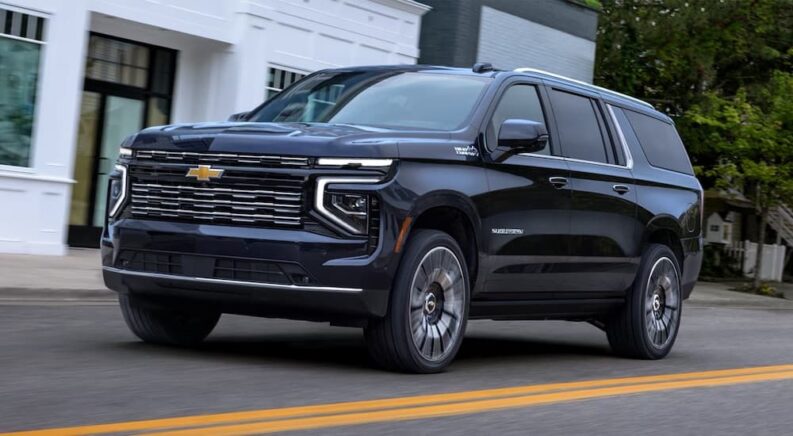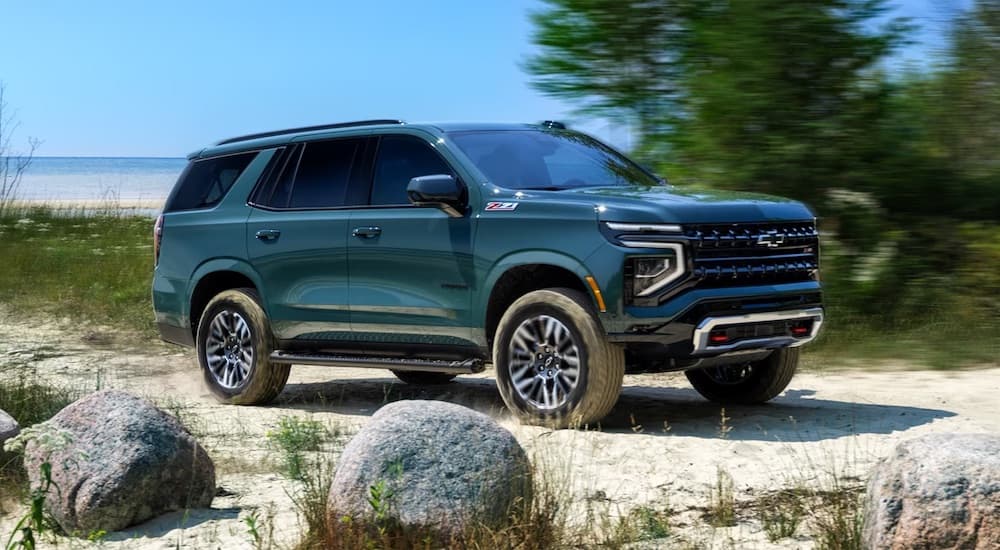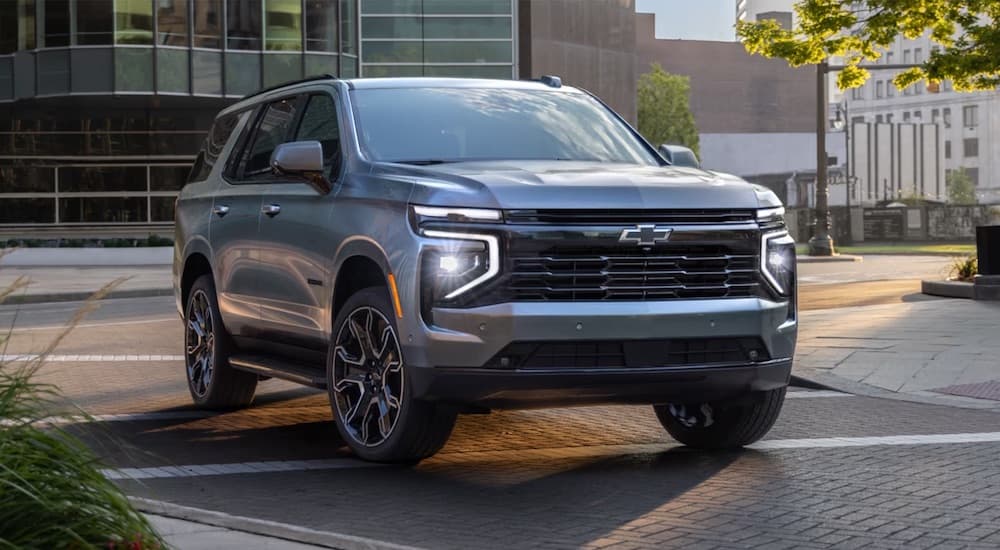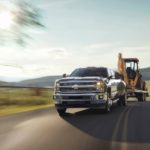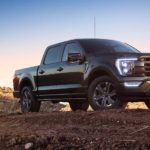It’s fair to say that diesel doesn’t have the best reputation in the US. Years ago, this bias was pretty well-founded: old diesel engines were loud, provided a hard ride, and emitted an ungodly amount of smog. But advances in engineering have changed that. Today’s diesel engines are quieter, smoother, cleaner, and must meet similar emissions standards as gas-powered vehicles. Most importantly, diesel-powered vehicles tend to be more fuel efficient than their gas-powered counterparts because a gallon of diesel contains more energy than a gallon of gasoline. Still, the stigma remains, and diesel options seem to shrink year after year.
With diesel options getting phased out from trucks like the Ford F-150 and Ram 1500, it’s heartening to see that the diesel engine is still available on not just trucks but SUVs as well, wherever you can find a Chevy for sale. The full-size Tahoe and Suburban are getting a major redesign for the 2025 model year. While overall trends might have you worried that the diesel option for these SUVs would get the ax, it’s getting an upgrade instead.
What exactly is the diesel engine for these SUVs, and what makes it better than what came before? We’re going to dive into the details and give you the full scoop. With these powertrains becoming harder and harder to find, it’s worth keeping track of which models still keep this option available.
New & Improved Engine
Not only do these SUVs keep the diesel engine around, but they also make an effort to improve it. While the gas-powered V8s on the 2025 Tahoe and Suburban are the same as the ones you’ll find under the hood of 2024 models, the diesel engine has been updated to increase power. This second-generation 3.0L inline-six Duramax turbo-diesel engine, which previously debuted under the hood of the 2023 Silverado 1500 pickup, has had its turbo compressor retuned, its fuel injectors replaced with higher-flow versions, its piston-cooling oil jets revised, and its temperature control features improved. The result of all this engineering is a 10% increase in horsepower and a 7.6% increase in torque. While the old engine produced 277 hp and 460 lb-ft of torque, the new one raised the stats to 305 hp and 495 lb-ft of torque.
Of course, more power is good news both for driving in general and for towing in particular. Torque-heavy diesel engines make towing heavy loads a much easier task, which is certainly important for a full-size SUV. Giving a heavy vehicle like this extra power also comes in handy in more everyday driving situations, like getting up to speed on the highway or passing bulkier, slower vehicles on rural roads (hopefully, people won’t attempt that last one while also towing a heavy trailer).
Beyond cranking up the power, Chevy has also put some thought into ride quality. The powertrain has received new sound absorption materials to keep things quiet in the cabin, even when the engine is working overtime. A newly tuned air induction system paired with the cooling system’s Active Thermal Management should also help keep things nice and refined without sacrificing power. Fine-tuning that balance is central to the art of making a quality powertrain.
Now Available on the Z71
The diesel powertrain doesn’t come standard on any trim of the 2025 Suburban or Tahoe—it’s an optional upgrade across the board. However, it is truly available across the entire board, all the way down to the base LS trim and all the way up to the top-tier High Country. No matter what kind of interior amenities a driver is looking for, they’ll have the option to pair them with an efficient diesel engine.
For the most part, this isn’t really news. The 2024 models of these SUVs already had the diesel powertrain available on the LS, LT, RST, Premier, and High Country trims. But there is one trim missing from that list: the off-road capable Z71. Since torque is a big deal on rough terrain, adding it to this trim is a no-brainer. The old turbo-diesel already provided way more torque than the base 5.3L gas-powered V8, which continues to produce 383 lb-ft. However, it had to settle for a tie with the available 6.2L V8, which produces 460 lb-ft and continues to beat out the diesel option when it comes to horsepower thanks to the 420 hp it can crank out. The new diesel powertrain now has the highest torque figure in the lineup with its 495 lb-ft, so it only makes sense to give off-roaders the option of upgrading to it if they want to.
Other Diesel SUV Holdouts
If you want a diesel SUV in the US, your options are basically to get a GM model or head to a used car dealership. Forget about 2025 models—most automakers don’t have diesel options available in their 2024 lineup of SUVs. The Mazda CX-5 nixed its diesel engine after 2019, and Land Rover discontinued its diesel options for the US in 2021. The Jeep Wrangler held out longer, but even this slow-to-change icon cut the diesel engine from its lineup for the 2024 model year.
However, since GM has a few other automakers under its umbrella, there are some non-Chevy holdouts remaining. The GMC Yukon and Yukon XL are basically the Tahoe and Suburban with different styling and features that result in a higher price tag. You can get even pricier and even fancier with the 2024 Cadillac Escalade and Escalade ESV, which are—yet again—based on the Tahoe and Suburban. No matter which brand’s version you prefer, the diesel option will give you the best fuel economy figures while still providing sky-high torque and offering a solid towing capacity.
Diesel Isn’t Dead Yet
As hybrid and even EV options become established in new segments, like full-size pickup trucks and SUVs, fewer automakers are turning to diesel engines as fuel-efficient alternatives to traditional gas-powered engines. But, for now, hybrid and EV alternatives still tend to have lower towing capacities, even when they deliver higher amounts of horsepower and torque. Towing a heavy load can drain a battery pretty fast, especially when the weather isn’t cooperating, and while recharging is getting faster, it’s still nowhere near as fast as refilling a tank of fuel.
For today, at least, diesel still fills an important niche. Drivers looking for a full-size SUV don’t want an alternative that’s going to give them less towing power, but if they can pay less for fuel while still bringing their heavy trailer along for the ride, then they might just be willing to pay a premium to upgrade. Thinking about it that way, Chevy’s decision to not just keep the diesel option around in its full-size SUVs but give it an upgrade and mention it prominently in press releases about the 2025 redesign feels like a smart move. Time will tell whether drivers will take Chevy up on this offer, and the fact that the engine isn’t standard on any trim is certainly something of a hurdle, but whether it’s popular or not, we’re glad to see it. In the search for efficient vehicles, it’s not bad to have a diverse range of options—the more, the merrier.

